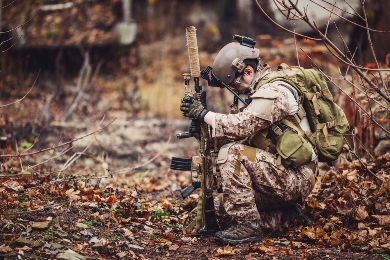13 November 2017
 Post-traumatic stress disorder, depression and poor mental health are now responsible for more veteran deaths on home soil than lives lost while on operations.
Post-traumatic stress disorder, depression and poor mental health are now responsible for more veteran deaths on home soil than lives lost while on operations.
UniSA researcher Lisa Ranson, a speaker at the 2017 Narratives of War Symposium – Generations of War, says how we talk about PTSD can influence better health outcomes for veterans.
Speaking at the symposium on 17-19 November, Ranson will present her new research including a model to help unpack how language may affect service-people and veterans.
Ranson is part of a UniSA research team led by Dr Leanne Glenny that has analysed the coverage of veterans and post-traumatic stress disorder (PTSD) in civilian and military media.
By analysing the portrayal of veterans’ mental health and the language used in those representations, the team seeks to create a better understanding of how these portrayals influence the community.
“I looked at what kind of identity people with PTSD are given, how responsibility for their health is allocated or mitigated, and why that is important,” Ranson says.
“I hope that by shedding light on language, changes can be made to shift negative perceptions and help eliminate the social and interpersonal barriers to seeking help.”
With all evidence suggesting early intervention gives the best outcome for people affected by trauma, Ranson says it is vital that we build a media and cultural environment where veterans are encouraged to seek help.
In another session at the Symposium, UniSA’s Associate Professor Brad West will lead discussion about establishing a new research agenda focussing on the Defence Reserves.
“The Defence Reserves have traditionally been neglected as an area of study, but given that in Australia and other Western nations we are increasingly drawing on Reserve forces for deployment to war zones, there is a significant need for research,” Assoc Prof West says.
“Increasingly as far as operations are concerned the lines between regular and reservist forces are becoming blurred. There is a real need to examine the differing culture and tensions between regular and reservist units in the military, the barriers integrating the two components of the armed forces, and whether there should be differences in how the forces operate.”
The panel discussion will explore the ways that Reservists may have a distinctive military experience and face particular problems in balancing civil military role identity, particularly in relation to career management, commemoration, deployment, enlistment and trauma management.
Held every two years, the Narratives of War Symposium provides a unique opportunity for community and industry engagement, bringing together researchers, scholars and industry professionals with a shared interest in the reality and legacy of war and conflict.
This year’s symposium, Generations of War, is hosted by UniSA’s School of Creative Industries in partnership with the Military Historical Society of Australia and features 37 presentations focussed on military history, the experience of veterans past and present and a range of defence issues.
Sponsored by Veterans SA and the Defence Reserves Association, the Symposium will include dedicated sessions on Defence Reservists, as well as keynote presentations by Professor Melanie Oppenheimer, Chair of History, Flinders University and Professor Alexander McFarlane, Head of the University of Adelaide Centre for Traumatic Stress Studies.
Generations of War will be held at UniSA’s City West campus. For more information about the conference and registrations contact kerry.green@unisa.edu.au or phone 0408 592 625. Please visit our website for further details.
Media contact: Georgia Minarelli mobile: +61 413 314 726 email: Georgia.Minarelli@unisa.edu.au


